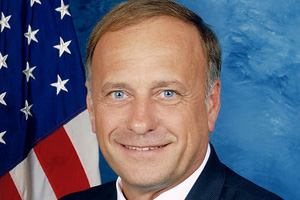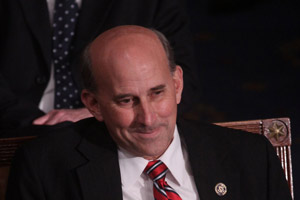
<a href="http://commons.wikimedia.org/wiki/File:Steve_King,_official_Congressional_photo_portrait.jpg">Congressman Steve King</a>/Wikimedia
![]() This story first appeared on the TomDispatch website.
This story first appeared on the TomDispatch website.
There are some things to be thankful for.
The woman who puzzled over Hispanics in her audience of high-school students and suggested they looked “Asian” was defeated in her run for the Senate in Nevada. The guy who called Islam a cult was knocked out of the Kentucky gubernatorial race. The bizarre candidate who threatened to “take out” a reporter was brushed aside in his bid for the governorship of New York.
Despite the electoral failures of Sharron Angle, Ron Ramsey, Carl Paladino, and a host of others inhabiting what used to be America’s political peripheries, the next Congress will have a decidedly fringy tone. No wonder the wilder types already there are looking forward to the January 2011 legislative session with such relish: so many investigations crying out to be launched; so many dictators and thugs still hanging on in Cuba, Iran, North Korea, and Venezuela; terrorism in the streets of Portland; foreign terrorists flocking to America; secret government documents splayed across the front pages of our newspapers.
They wonder if the US hasn’t simply become a pitiful, helpless giant. But the rest of us ought to wonder just what kind of politics is going to grow in the strange, rich Petri dish of the new Congress.
Consider just one area that will be a major focus of Congressional interest: immigration, an issue that will gain potency as it melds into the rhetoric of terror.
Foreigners and terrorists: Really, what’s the difference? That the nation has grown and prospered precisely because of adaptive immigration is beside the point, an obvious reflection of someone caught in the old mindset of the September 10th world. Interestingly, though, only about 8% of those who cast ballots in the 2010 election cited immigration concerns as their primary motivator. Of those who did, however, nearly 70% were Republicans.
With their new House majority, the Republicans plan to pay some major attention to that 8% of the motivated electorate. Immigration matters will play out largely in two key House committees, Homeland Security and Judiciary, and critical members of each committee told me they intend to investigate past actions of the Obama administration “fully and completely,” block any kind of comprehensive immigration reform, expose supposed lax enforcement of immigration laws and inadequate resources devoted to—as one Judiciary member put it—”boots on the ground.” Terrorism will play a key role in hearings on virtually all these topics, most dramatically, no doubt, in focusing attention on what Republicans view as a shadowy Latin network of terrorist infiltrators seeking to exploit the US failure to protect its own southern border.
 Most people are probably blissfully unaware of a burgeoning conspiracy in which Cuba and Venezuela are reputedly assisting African and Middle Eastern extremists as they slip into the United States and fan out across the country. That lack of awareness will not last long, however, if the new Republican majority in the House has anything to do with it. Key representatives are already promising to pound the drums ever more loudly and so expose this supposed burst of clandestine activity over the next couple of years. More on that in a moment.
Most people are probably blissfully unaware of a burgeoning conspiracy in which Cuba and Venezuela are reputedly assisting African and Middle Eastern extremists as they slip into the United States and fan out across the country. That lack of awareness will not last long, however, if the new Republican majority in the House has anything to do with it. Key representatives are already promising to pound the drums ever more loudly and so expose this supposed burst of clandestine activity over the next couple of years. More on that in a moment.
Peter King, vocal New York Republican opponent of the Lower Manhattan Islamic cultural center, aka the mosque at Ground Zero, will soon become chair of the Homeland Security Committee. He has made it all too clear that he intends to “investigate” with abandon and continue to birddog that dreaded Manhattan “mosque.” King’s focus will serve to keep the specter of imminent terrorism directly before the country, infusing all manner of issues with claims and insinuations about bombs, plots, and massive threats.
He has made it no secret that he wants hearings on the administration’s failure to put more money into protecting New York City from the threat of nuclear terrorism, on what kinds of screw-ups led to the Fort Hood shootings last year, and on what King views as the Obama administration’s unconscionable plans to close Guantanamo and the Justice Department’s plans to hold 9/11-related trials in New York civilian courts. (That neither of these “plans” is exactly at the top of the Obama agenda anymore won’t matter a bit.)
King is a firm believer in Fortress America, too: in the creation, above all, of an impregnable fence along the border with Mexico. For want of such a fence, the nation’s “homeland security” will, he insists, be eternally “at risk,” as he wrote Homeland Security Secretary Janet Napolitano in a joint letter with Darrell Issa, the California congressman who will conduct his own set of investigations as new chair of the House Oversight and Government Reform Committee.
King sees Islam as virtually synonymous with violent extremism and, during last summer’s raging controversy over whether Imam Feisal Abdul Rauf’s proposed Manhattan Islamic center should be built, he called for an investigation of its funders. (In fact, there are, as yet, no funders.) Now, developers of the Islamic center—called Park51—are seeking public economic development funds aimed at blighted downtown Manhattan. King doesn’t like that either. “It’s an affront to the memory of all those who were murdered on 9/11,” he insists. “This shows a gross insensitivity to the most fundamental feelings of New Yorkers and to those murdered on 9/11 it is a slap in the face that is a terrible insult.”
That Islam can be linked to terrorism is a no-brainer for the congressman and many other conservatives and Republicans. This same thinking has now infected the controversy over WikiLeaks. Why not, King wonders, label the largely volunteer WikiLeaks group a terrorist organization, thus facilitating seizure of its assets and arrests of anyone remotely associated with it, including presumably readers? Tom Flanagan, a former aide to Canadian Prime Minister Stephen Harper, has gone one step further, offering an idea that Republican leaders and conservative commentators appear to find appealing. Flanagan has proposed assassination as the fate for WikiLeaks founder Julian Assange.
Sarah Palin seems to agree. In a note on Facebook, she likened WikiLeaks to al-Qaeda. Of Assange, she wrote, “He is an anti-American operative with blood on his hands. His past posting of classified documents revealed the identity of more than 100 Afghan sources to the Taliban. Why was he not pursued with the same urgency we pursue al-Qaeda and Taliban leaders?” (There is, in fact, no evidence whatsoever that Assange has “blood on his hands.”)
This violent thinking has spread like the Ebola virus through conservative circles. William Kristol, editor of the Weekly Standard, typically wants to know why Assange and his colleagues have not been “neutralized” by the US government. Mike Huckabee, a former governor as well as past and possibly future Republican presidential candidate, suggests those associated with the leaks get the death penalty—but only after fair trials. “Any lives they endangered, they’re personally responsible for and the blood is on their hands,” he said. (One wonders why there is such a focus on bloody hands in the Republican Party.)
All Issues Are Terrorism Issues
What should be increasingly clear is that Republican members of the incoming Congress are looking for terrorism in ever more startling places. In fact, it seems that, for them, all domestic issues are potentially terrorist issues, perhaps none more so than immigration. Even in the current lame-duck session of Congress, their unsettling rhetoric has enswathed immigration in such claims. Take the debate over the Dream Act, which would provide an avenue to citizenship via military service or college attendance for foreign-born young people brought to this country at a young age by their undocumented immigrant parents.
Steve King, the Iowa Republican who will chair the Judiciary Committee’s immigration subcommittee, has been deriding the DREAM Act as a “special amnesty program [and] affirmative action program for illegals.” Should it become law, he warns of a day when student “illegals” would find themselves “sitting in the classroom next to… a widow or a widower or a son or a daughter of someone who has lost their life in Iraq or Afghanistan defending our liberty and our freedom.” Senator Jeff Sessions, Alabama Republican, goes King one better, suggesting that the DREAM Act could well pave the way for another 9/11 plotted by those “from the dangerous regions of the Middle East.”
Former San Diego mayor Roger Hedgecock, now a popular, nationally syndicated conservative talk radio show host, claims the DREAM Act is par for the course “in an era when the Obama regime considers terrorists citizens and citizens suspects—when Jesus’ birth is considered myth, but Obama’s birth is gospel.”
Steve King believes up to four million illegal immigrants a year are piling into the United States. These, he told me, add up to a “huge human haystack” composed of “vicious, violent criminals” and an unknown number of bona fide terrorists.
“As a sovereign nation, we must control our borders,” King argues. “We must ensure that terrorists do not infiltrate the United States. We must tighten and strengthen border control efforts so that illegal aliens and drug smugglers do not enter our country.” A building contractor back home in Iowa, King has even designed a border fence to show how easily the country could staunch the tide of “illegals” from Mexico and, of course, the terrorists among them. “We do this with livestock all the time,” he explained, as he described the fence to me.
Terrorists at the Door
The idea that terrorists are probing the southern border in the guise of immigrants has recently become part and parcel of Republican border-policy mythology. Michael McCaul, Texas Republican and current ranking minority member of the homeland security intelligence subcommittee, told me that “the border is going to be a focus” of extensive congressional investigation. “Who is coming into the country?” he wondered rhetorically in our conversation and added, “There is a massive tide of immigration without control.”
Among those furtively crossing the southern border, McCaul believes, are an unknown number of terrorist operatives. This past year, he notes, authorities arrested Anthony Tracy, an American Muslim, and charged him with assisting nearly 300 undocumented Somalis in entering the United States. Tracy told US authorities that a Cuban official in Africa helped provide papers for the immigrants, enabling them to reach Mexico. From there, the Somalis crossed over the southern US border and have now vanished.
Conservative pundits and some media outlets have made much of this, suggesting members of al-Shabaab, the Somali terrorist group, are now roaming the American countryside. But there is no tangible evidence that any member of al-Shabaab entered the country with Tracy’s help, according to an immigration spokeswoman.
McCaul said the Somali case and how the Obama administration let it happen would be a key topic in hearings in which he and other Republicans will demand answers. The real question is: Did it happen at all? Immigration authorities have not only been unable to find members of al-Shabaab who entered the country from the southern border—with or without Tracy’s help—they haven’t been able to locate any of them the 300 supposed Somalis at all.
The federal judge trying the case, US District Judge Leonie Brinkema of the Eastern District of Virginia, dubbed it “shaky” at Tracy’s trial. Absent any smuggled Somalis, she pointed out, the government was unable to prove anything. Given the presence of informers at the center of so many terrorism prosecutions since 9/11, it should come as no surprise that Tracy has a long and mysterious past as an informer for the Immigration and Customs Enforcement Agency and possibly the Drug Enforcement Administration as well. What that means in the Somali case remains unclear. It is, however, clear that Tracy served only a four-month federal sentence in the incident and is now chatting up authorities.
Keep in mind that murkiness is a useful political tool. It will certainly be the stuff of upcoming congressional hearings, which will echo the endless rounds of anti-communist hearings that dominated Washington in the heyday of the House Un-American Activities Committee and similar panels in the 1950s. What can’t be seen must be feared, and in the confused darkness, passionate certainty grows.
In that murky vein, Republicans also hope to expose the links they see among Iran, Hezbollah, and Latin American lands, especially Venezuela. Right-wing commentators and military analysts assert Hezbollah is increasingly active in the Colombian drug trade, is working with Mexican drug cartels, and has ties to Venezuelan authorities.
Rep. Sue Myrick of North Carolina, a member of the House Permanent Select Committee on Intelligence, has been increasingly vocal in denouncing Hezbollah’s reputed march toward the Rio Grande. Earlier this year, she shared her concerns with the Department of Homeland Security. Within weeks, Mexico reported that it had broken up Hezbollah operations, although what “Hezbollah” was actually doing, if anything, is difficult to say.
Nevertheless, the talk of Hezbollah on the border has grown crazily since the supposed arrest of Jameel Nasr, described in second- and third-hand news accounts as a “Hezbollah operative” in the border city of Tijuana, Mexico. This arrest, initially reported in July by a Kuwaiti newspaper, has not only not been confirmed, but Homeland Security officials insist that they have no “credible information” of any terror groups on the southern border.
That apparently is not good enough for the American right-wing. They prefer to follow one of the primary laws of the post-9/11 world: whatever can be imagined is in fact true. What “could be” invariably trumps what “is.” Is it possible that supporters of Hezbollah are plotting terror attacks from bases in Tijuana? Of course it is, therefore it must be so.
Could Somalis be lining up to travel to Cuba, Mexico, and Texas? It is possible, as so much is possible, therefore it must be so. A corollary to this law is that if a falsehood or rumor is repeated often enough, it becomes so. Hence, Jameel Nasr, Hezbollah operative, who may not even exist, actually was arrested as he plotted terrorist operations for Hezbollah just south of Texas.
A more realistic appraisal of Muslim activity in Latin America comes from an overlooked WikiLeaks document, a classified cable from the US Consulate in Sao Paulo, Brazil, which describes “the unique possibilities for Muslim engagement” with the US in that country. Writing at the end of 2009, the consul reported that there were some Hezbollah supporters among recent Lebanese immigrants to Brazil. (That in itself is hardly surprising since Hezbollah is a popular, deeply rooted political movement that controls significant parts of southern Lebanon.)
The consul also informed Washington that such immigrants were surprisingly few in number and were completely overshadowed by the country’s mainstream Muslim leaders, who have exhibited a keen interest in and curiosity about the United States, and are opposed to extremist ideologies of any kind. These leaders, he wrote, are eager “to engage, acutely aware of the dangers of radicalism, and had solid achievements in integrating Muslim and Brazilian identities, making them an excellent example of how a unique MMC [Muslim minority community] has, by and large, carved out a positive space within a diverse Latin American country.” In other words, in the real world, the vast majority of Muslims in Latin America are eager for the same kind of stability and engagement as Muslims in the US
But this view—and the importance it places on dialogue—does not fit the prevailing nativist mythology in this country or Republican and right-wing efforts to meld terrorism, Islam, and immigration into a single muddy brew (a characteristic of much public debate in the US since 9/11). It appears we have entered a post-analytic world where the point of public discourse is not to make distinctions but to obliterate them.
A tiny group of radical extremists, mostly from Saudi Arabia, have become indistinguishable from a billion and a half Muslims all over the world. A bizarre and convoluted ideology, worked out to justify specific attacks on the US and Egypt, has come to stand in for Islamic sacred texts and holy law. The roughly 50 al-Qaeda fighters remaining in Afghanistan have become a synecdoche for the whole of the Muslim Middle East and South Asia.
Political dissenters in the United States have been absorbed into the terrorism trope as well. Information—which is, after all, what has been disseminated by WikiLeaks—is increasingly viewed as a potential terrorist weapon. Absorbing that information (that is, reading the documents) could even amount to material support for terrorism. In such a world, the counter-terrorism efforts of the US government are trained on the entire civilian population, whether through electronic monitoring or fiddling with everyone’s junk.
Former attorney general John Ashcroft noted the importance of blurring all distinctions years ago. “In this new war, our enemy’s platoons infiltrate our borders, quietly blending in with visiting tourists, students, and workers,” he proclaimed in June 2002. “They move unnoticed through our cities, neighborhoods, and public spaces. They wear no uniforms. Their camouflage is not forest green, but rather it is the color of common street clothing. Their tactics rely on evading recognition at the border and escaping detection within the United States. Their terrorist mission is to defeat America, destroy our values and kill innocent people.”
It’s all right there, hidden in plain sight. Terrorists are Muslims, Muslims are immigrants, immigrants are residents. Around it goes. Increasingly, immigration enforcement is becoming an anti-terrorism effort. Anyone and everyone is a suspect. That is the reality played out at every airport; it is the narrative touched by every monitored email and tapped telephone call.
We are a fearful nation eating away at itself and the wolves are prowling the southern borders. Welcome to Congress, 2011.
Stephan Salisbury is cultural writer for the
Philadelphia Inquirer
. His most recent book is Mohamed’s Ghosts: An American Story of Love and Fear in the Homeland. To listen to Timothy MacBain’s latest TomCast audio interview in which Stephan Salisbury discusses the terror dreams of a nostalgic empire, click here or, to download it to your iPod, here.












